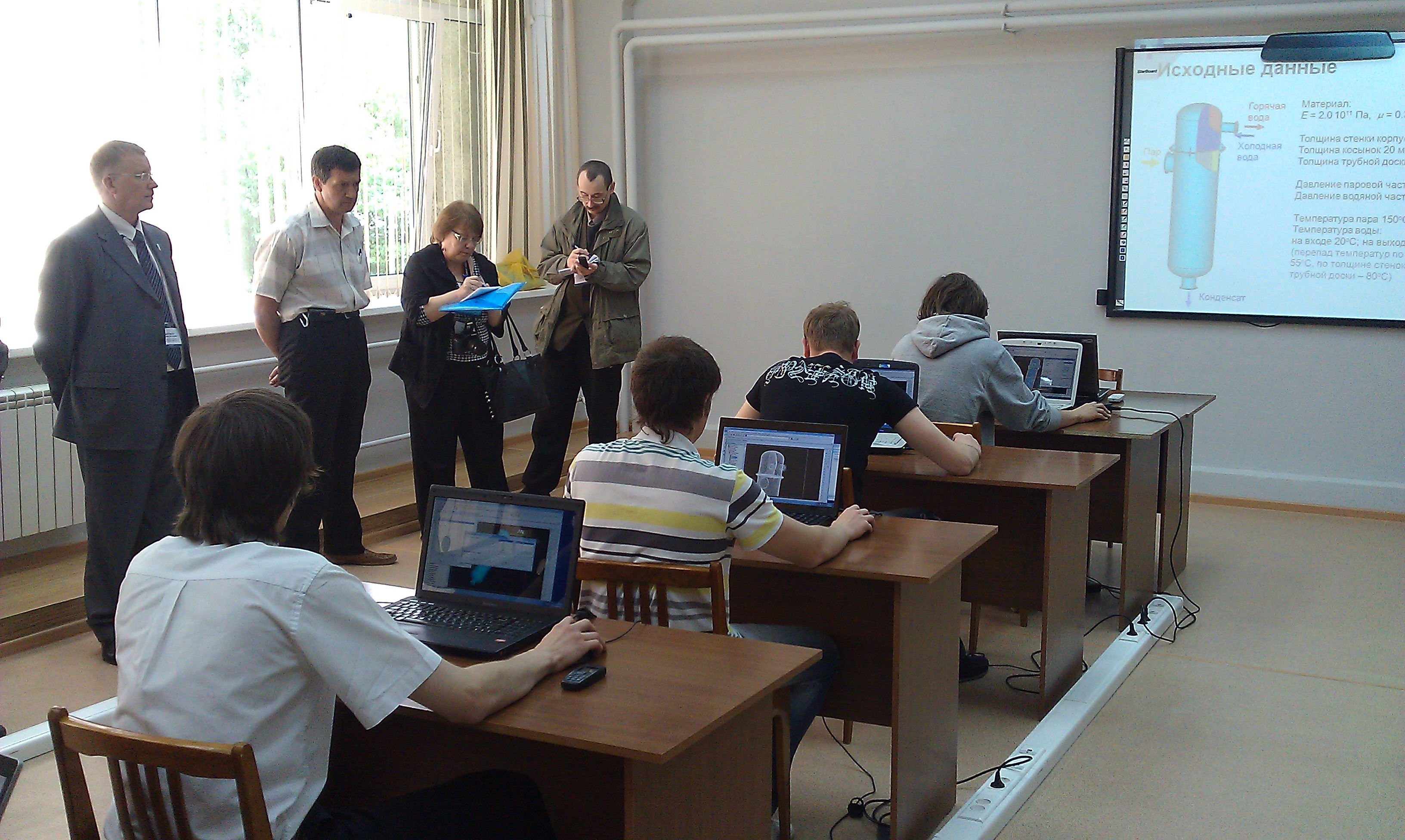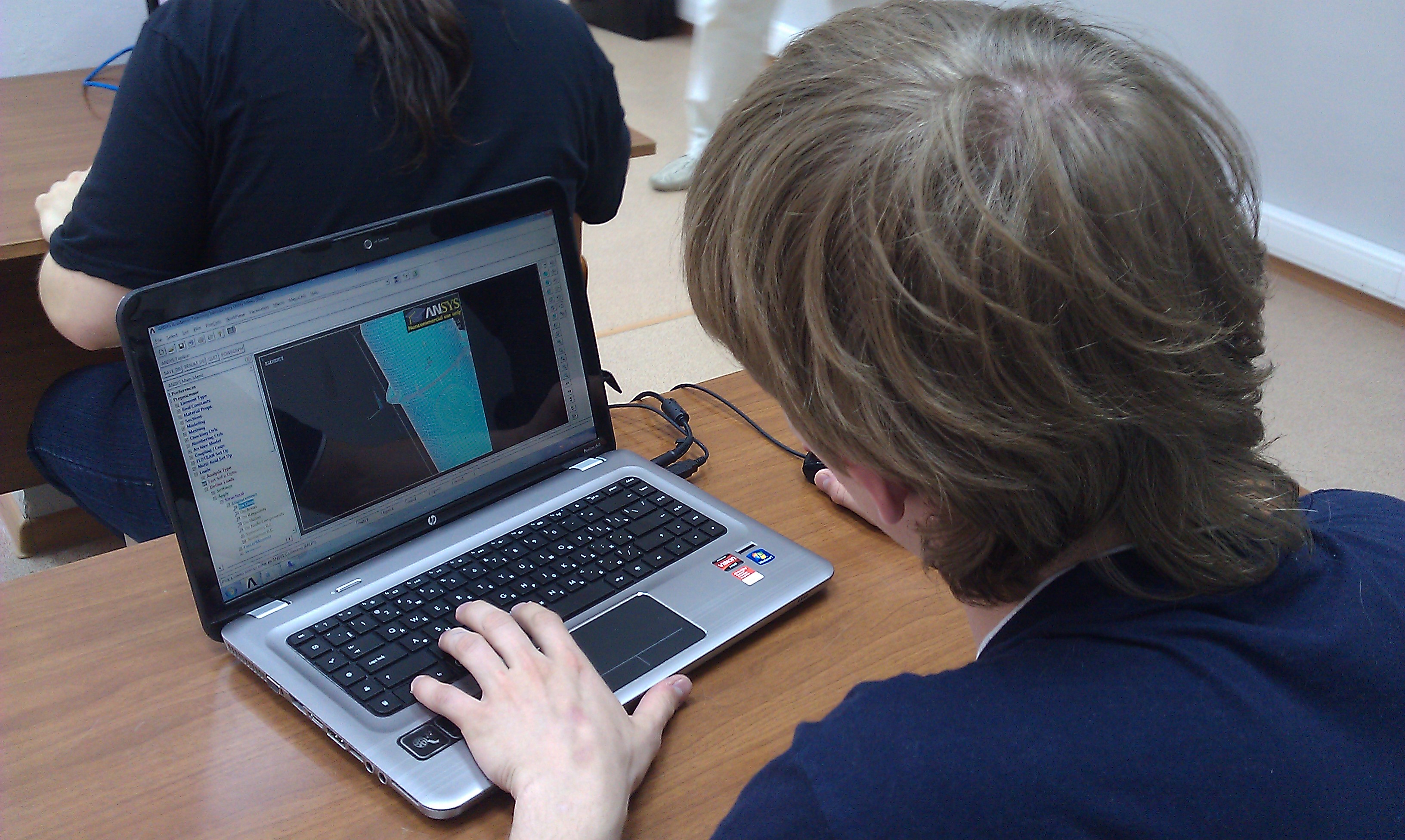Chelyabinsk, May 26, 2011. South Ural State University (SUSU) presented a Personal Virtual Computer educational platform based on cloud computing technology. SUSU started to use the platform for education and training of engineers and technical professionals. The project is implemented and deployed by RSC SKIF with participation of specialists from SUSU and Intel Corporation, which initiated the project.
This is Russia’s and CIS first example of a full-fledged implementation of cloud-based platform in the undergraduate learning process.
"Implementation of this project evidences SUSU’s transition to the new principles of training engineers and technical professionals. Improvement of engineering education would be impossible without using the most innovative information technologies in the learning process, which certainly include cloud computing”, said Dmitry Tarasov, the Minister of information technology and communications in the Chelyabinsk Region.
The importance of advanced computing technologies in the learning process at engineering and technical faculties of universities is evidenced by a special emphasis on engineering education quality improvement, which was made by the President of the Russian Federation Dmitry Medvedev on March 30, 2011, at a meeting of the Commission for Russian Economy Modernization and Technology Development in Magnitogorsk, the Chelyabinsk Region. “Despite the fact that almost 200,000 engineers graduate from the Russian universities, this country faces shortage of qualified engineering staff", noted Dmitry Medvedev during the meeting with executives of manufacturing companies on March 23, 2011. He also said that learning programs in most Russian universities are outdated and do not meet the requirements for professionals in a modern enterprise. “Evidently, learning programs need alignment in most universities. It is also evident that most graduates and undergraduates lack operational experience”, the President considers.
“A modern engineer needs perfect skills in CAD, modeling and analytic technologies when creating new technology solutions. Implementation of an innovative Personal Virtual Computer cloud-based educational platform in South Ural State University opens new prospects for modernization and increased effectiveness of engineering education in Russian universities. This would undoubtedly facilitate further development of innovative and competitive economy and industry in this country. The goal can be achieved through providing the professionals the newest skills and knowledge in engineering and technical area and the practical experience in using advanced technology during their university studies, - said Alexander Shestakov, Rector, SUSU National Research University. “Today we have demonstrated the new approach on the example of just one engineering specialty. Next academic year our University will start using the cloud-based learning platform to the fullest extent. The instrument-making faculty will be the first, and then the remaining eleven SUSU engineering and technical faculties will migrate to the platform. We expect that in 2 or 3 years the whole University will use the new technology for training of future professionals.
Presently SUSU started pilot operation of the cloud-based educational platform. Its common use in the learning process was exemplified by a practicum held in an undergraduate group.
“The innovative cloud-based Personal Virtual Computer educational platform makes the traditional notion of a computer class obsolete. Now, you can organize a modern and the most effective learning process in any classroom using notebooks and a wireless network. Cloud computing technology and the learning platform implemented on its basis allows for the most effective use of software and hardware resources; engineering undergraduates can use state-of-the-art computer technologies during every class", says Leonid Sokolinsky, Dean, Computing Mathematics and Informatics faculty, the head of SUSU Supercomputing Modeling Laboratory, South Ural State Unversity, who also manes the project on the part of SUSU.
What is cloud computing?
Cloud computing is a distributed data processing technology which provides computing resources and processing power as a Web service to users. Cloud data processing is a paradigm when software and data are permanently stored in remote data centers that include powerful servers and supercomputers. Access to the computing services is provided transparently for the user via Interment and a client device, such as personal computers, notebooks, tablet PCs, smartphones etc.
What is Personal Virtual Computer?
Personal Virtual Computer (PVC) is a single access point to services that make up the innovative learning environment in a university on the basis of cloud computing technology.
When a student matriculates, a personal virtual computer with an individual profile is created for him/her. PVC is gradually updated with the relevant learning services as the student masters the learning program. After graduation the alumnus can keep using PVC as a part of the alumni virtual community.
Undergraduates use their personal WiFi-enabled notebooks or netbooks to run PVC.
Digital content as a service for the university learning environment is created by lecturers who have their own PVCs. They develop new cloud-based learning services including digital training packages, lecture summaries and video records, laboratory work guidelines etc.
What are the benefits of the cloud-based PVC platform for learning?
The modern and innovative approach to the training of specialists in universities has the following benefits:
- effective use of classroom space (there is no need to allocate specially equipped rooms for traditional computer classrooms);
- radical reduction of costs for computer class creation and support;
- a whole new level of getting up-to-date special knowledge — the students are able to learn any time and any place where Internet connection is available.
- a more effective interactive learning process;
- ability to quickly create and replicate educational services during the learning process;
- students can give their feedback to the lecturers by assessing and commenting on the educational services offered;
- guaranteed license protection of software used in the learning process;
- reduction of costs for software licenses by creating a functional equivalent of educational services based on open source software;
- minimum number of licenses due their centralized use;
- centralized management of software and information resources used in the learning process;
- the most effective use of clustered computers available in the university.
SUSU cloud-based solution details
South Ural State University has one of the most powerful supercomputing centers in Russia and CIS countries. The center is actively used by teachers and undergraduates to complete scientific, industrial and economic tasks. A world-class supercomputer modeling laboratory is successfully used in SUSU. Last year, RSC SKIF put into operation its own development, SKIF Aurora SUSU, in the University. The supercomputer is based on the highest-performing six-core Intel® Xeon® Processors 5600 Series running at 3.3 GHz and an advanced liquid cooling system (on the motherboard level). Presently, this is the most energy efficient supercomputing solution in CIS countries based on x86 standard architecture. SKIF Aurora SUSU has the performance of 117 TFLOPS (trillion operations per second) and occupies the 3rd place in TOP 50 rating of CIS most powerful supercomputers (as of March Top50).
“Fast implementation of the innovative solution in order to increase the effectiveness of the learning process and the knowledge quality of future specialists in SUSU through cloud computing was ensured by flexible standard architecture of Intel platform that allows using it both for creating high-performance solutions and the cloud-based platform in SUSU. The architecture enables significant reduction of costs related to building of the solution due to reuse of existing equipment, which would be impossible in case of non-standard and/or specialized hardware and software solutions, as most software is developed for standard platforms, says Nikolay Mester, corporate project development manager, Intel Russia. “Implementation and use of this solution will allow for simple and effective engagement of students, postgraduates and lecturers into an information environment which develops on a permanent basis.<0} {0><}0{>In order to facilitate access to information our company together with SUSU plans to establish a special reimbursement program that will help the University students and lecturers buy access devices (notebooks, netbooks etc.).
The software and hardware complex is based on a private cloud concept with computing resources fully controlled by the user organization, i.e. SUSU. Scalable PaaS (Platform as a Service) solutions were developed and implemented on the existing SUSU computing resources. RSC SKIF cloud platform also includes several additional software products available to undergraduates and lecturers as a service (SaaS – Software as a Service). The number of these products can be increased by integration of custom developments into the cloud environment. As far as more computing resources become available for the University private cloud, further extension of educational services is planned in order to make learning process more effective in SUSU.
“RSC SKIF has always positioned itself as a complete-cycle developer and integrator of next generation complex supercomputing solutions. Our goal is not only development of the hardware part of a project and installation of a supercomputer on customer’s site with a data center creation, but also further development of services based on the installed equipment for maximization of return on investment. We consider cloud-based services one of the most promising areas in utilization of supercomputing resources.That is why our company established a software development department. Its specialists implemented the cloud-based educational platform proceeding from requirements and challenges faced by today’s Russian universities, such as SUSU, which owns one of the most powerful supercomputer centers in this country. We appreciate active cooperation and consultations on the part South Ural State University staff during implementation of the project", said Alexey Shmelev, chief executive officer, RSC SKIF.





